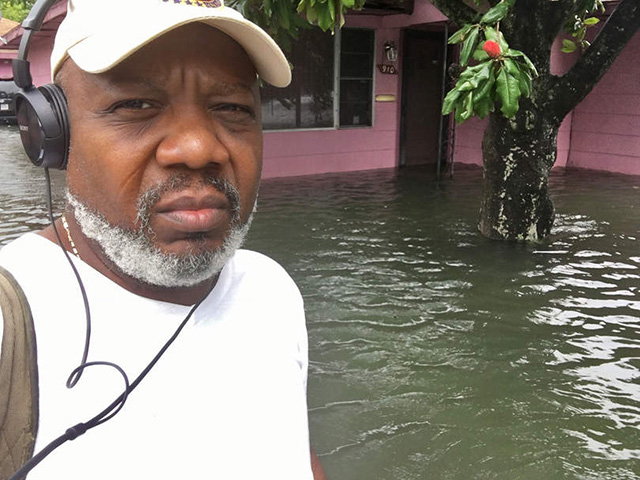
Support justice-driven, accurate and transparent news — make a quick donation to Truthout today!
Hurricane Harvey’s floodwaters were still receding from Port Arthur, Texas, on September 4, when Hilton Kelley and his wife Marie returned to their home and business for the first time since evacuating.
Port Arthur is located about 100 miles east of Houston on the Gulf Coast. The heavily industrialized area rivals Louisiana’s Cancer Alley, with an even greater concentration of hazardous waste and petrochemical facilities.
Kelley is intimately familiar with the town’s refineries. He spent the last 17 years fighting for clean air and water in the Port Arthur community adjacent to those refineries. His work earned him the prestigious Goldman Environmental Prize, which is awarded to “grassroots environmental heroes” — something of a Nobel Prize for environmentalists.
Despite winning some battles against the oil and gas industry, getting it to curtail its toxic emissions, the community is facing new challenges with the roll-back of regulations under President Trump, and Harvey’s devastation.
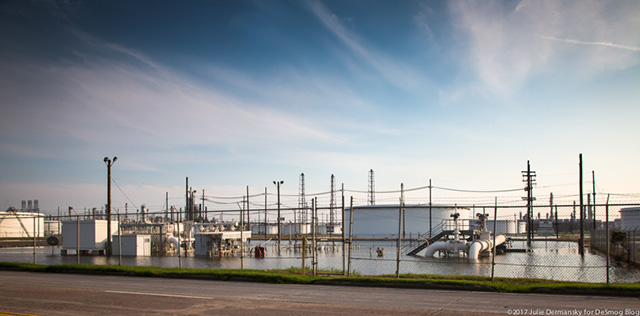 Standing water remains on the grounds of Motiva’s refinery in Port Arthur, Texas, days after Hurricane Harvey flooded the area. (Photo: Julie Dermansky)
Standing water remains on the grounds of Motiva’s refinery in Port Arthur, Texas, days after Hurricane Harvey flooded the area. (Photo: Julie Dermansky)
Both the Motiva and Valero refineries, which are located next to each other in Port Arthur, flooded and were shut down due to the hurricane. On September 4, the facilities still had standing water visible from the road. Though both refineries had flares burning, neither had started up operations yet. When they do, they will emit even more hazardous materials, including the known carcinogen benzene, than usual, which is often the case when refineries go off-line and start back up.
Kelley got angry when he learned that the U.S. Environmental Protection Agency (EPA) relaxed air pollution standards for the oil and gas industry as facilities restart operations in the wake of the storm.
In addition, the EPA waived certain Clean Air Act requirements for gasoline producers nationwide in order to make up for the inevitable fuel shortages due to the storm.
Returning After the Flooding
I met Hilton and Marie at the house of Marie’s 96-year-old grandfather, Joseph A. Lavine, whose house was flooded by a couple feet of water. Kelley was the first to go inside, followed by other family members. The smell of mold was overwhelming. They opened the windows to air the house out.
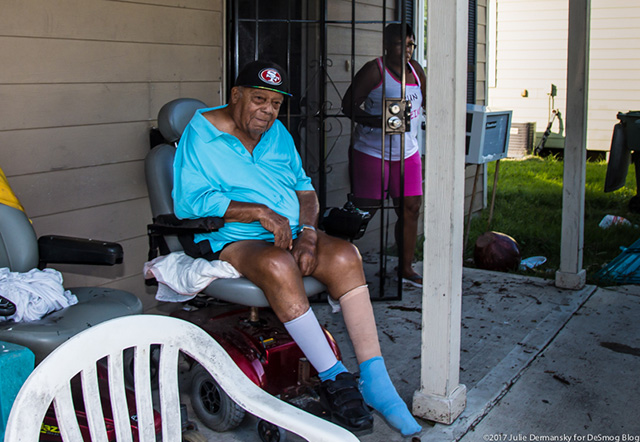 After returning from Louisiana, Marie Kelley with her grandfather, 96-year-old Joseph A. Lavine, in front of his recently flooded home in Port Arthur. (Photo: Julie Dermansky)
After returning from Louisiana, Marie Kelley with her grandfather, 96-year-old Joseph A. Lavine, in front of his recently flooded home in Port Arthur. (Photo: Julie Dermansky)
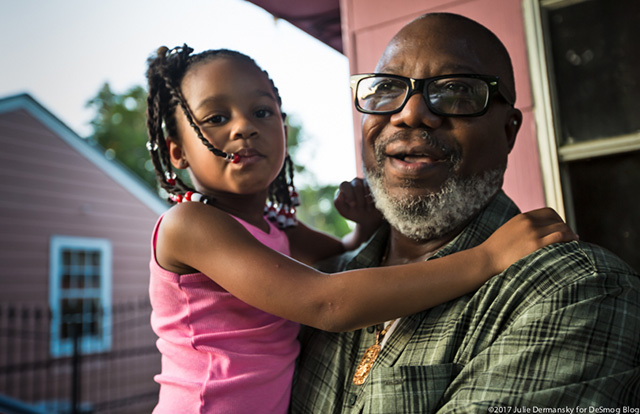 Despite the hardships facing Hilton Kelley, he breaks out in a smile when joined by his granddaughter. (Photo: Julie Dermansky)
Despite the hardships facing Hilton Kelley, he breaks out in a smile when joined by his granddaughter. (Photo: Julie Dermansky)
From there, the Kelleys went to check on Kelley’s Kitchen, their nearby Southern soul food restaurant, where they offered reasonably priced meals cooked from scratch to their community and where they took shelter from Harvey. While the pair was inside, part of the roof blew off, causing the building to flood from above as well as below. Kelley tried, but was unable, to fix the roof as the storm bore down on them.
He and his wife ended up leaving the restaurant in a hurry after getting word of a possible evacuation route that led to Louisiana. Along with some of their family members, the Kelleys evacuated to Baton Rouge, trying three different routes before finding a road where the standing water was low enough to pass.
Days after they evacuated from it, I followed the Kelleys into their restaurant. Upon entering, a wave of stench hit us. Thinking they would have to hunker down in the restaurant to ride out the storm, the couple had cooked up rice and beans. The pot of beans and the rice cooker sat where they had left them, their contents now covered in mold.
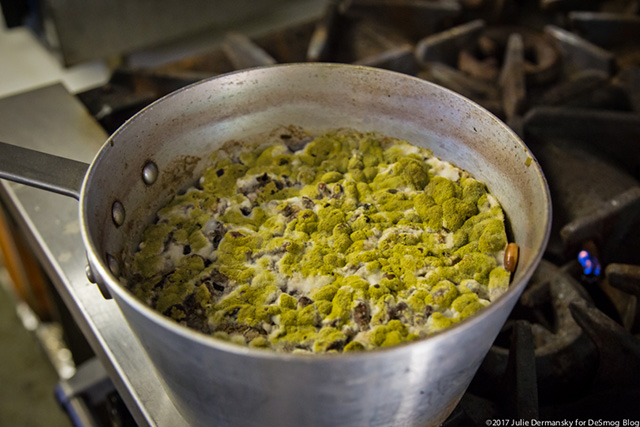 A pot of beans the Kelleys prepared in their restaurant before deciding to take their chances and evacuate Port Arthur on flooded roads. (Photo: Julie Dermansky)
A pot of beans the Kelleys prepared in their restaurant before deciding to take their chances and evacuate Port Arthur on flooded roads. (Photo: Julie Dermansky)
Though power had returned to the building, it had been off for some time, causing food in the refrigerator to start decaying. “There are already maggots in the food,” Hilton said as he removed it from the refrigerator. The Kelleys estimated that they lost almost $2,000 worth of food.
As the pair emptied the refrigerator, Hilton recounted how upset he was after hearing Trump speaking on CNN in Lake Charles, Louisiana, a few days before.
“Trump has done us a serious disservice,” Kelley told me. It angered him that the president made the hurricane cleanup sound like it was in full swing. “Nothing has started in Southeast Texas, besides a lot of photo ops — that is the only thing that started here,” he said. Many have not returned to their homes, some of which still held standing water.
Kelley fears that Trump’s everything-back-to-normal message will discourage desperately needed help from arriving in Port Arthur, where the predominantly African-American fence-line community is at or below the poverty level.
Recovery from the storm can’t start in a meaningful way until the money needed to rebuild arrives, he said.
After stopping at the restaurant, we made our way to the Kelleys’ home which also flooded. Once again, the couple was greeted by the smell of decay. Like many in Southeast Texas recently, the two walked through their house, assessing the damage and facing the reality that most of their possessions were destroyed. Both of them passed from room to room in dismay.
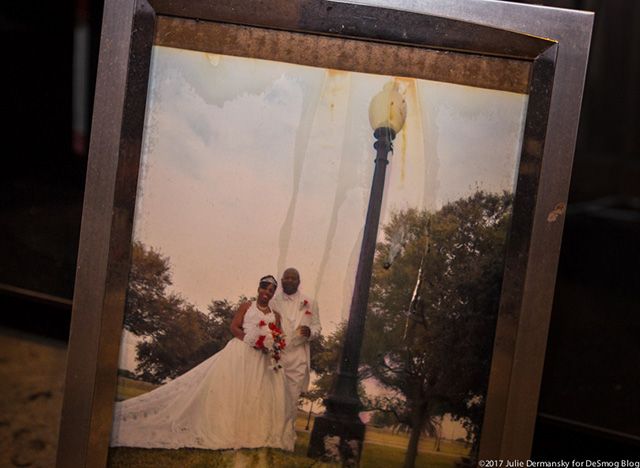 The Kelleys came back to their home in Port Arthur, Texas, to find all of their photos damaged by Hurricane Harvey’s floodwaters. (Photo: Julie Dermansky)
The Kelleys came back to their home in Port Arthur, Texas, to find all of their photos damaged by Hurricane Harvey’s floodwaters. (Photo: Julie Dermansky)
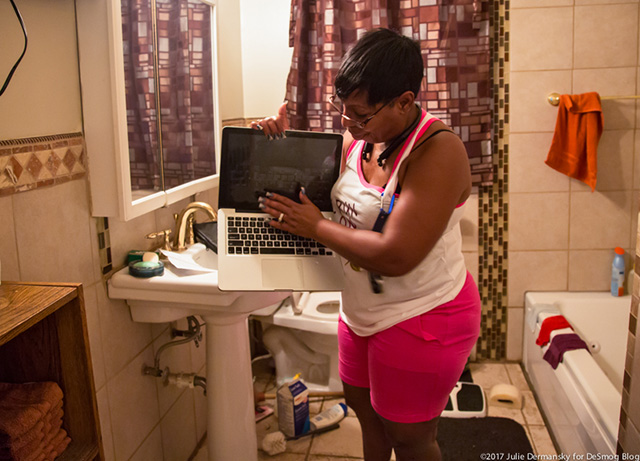 Marie Kelly opens her computer to find water running out of it. (Photo: Julie Dermansky)
Marie Kelly opens her computer to find water running out of it. (Photo: Julie Dermansky)
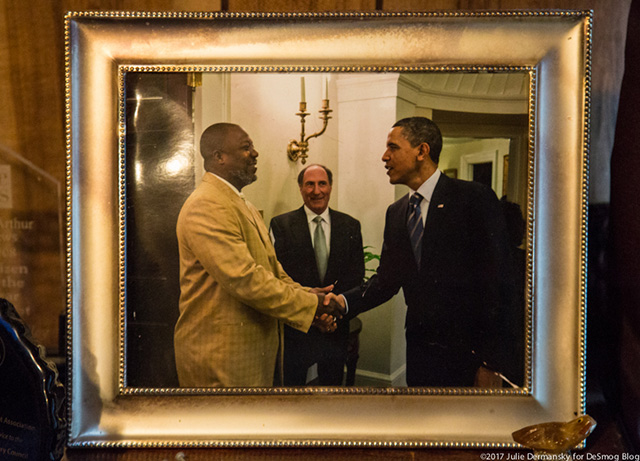 A photo of Hilton Kelley with President Obama on the wall of Kelley’s recently flooded home in Port Arthur, Texas. (Photo: Julie Dermansky)
A photo of Hilton Kelley with President Obama on the wall of Kelley’s recently flooded home in Port Arthur, Texas. (Photo: Julie Dermansky)
Hilton tried to rescue some papers he had saved for 20 years — plays and poems he had written. I helped him spread them out on the couple’s bed, neither of us knowing whether it would help or not.
In the kitchen, Hilton wrapped Marie in a big hug. After their embrace, Marie cried, and Hilton tried to comfort her by coming up with a plan, reassuring her that everything will be all right.
For the time being, the Kelleys’ extended family will stay at their daughter’s house nearby, which had been spared. Though the couple was able to get FEMA vouchers for hotels, Marie told me that, as far as she knew, the nbsp;in Austin, Texas — about 250 miles away.
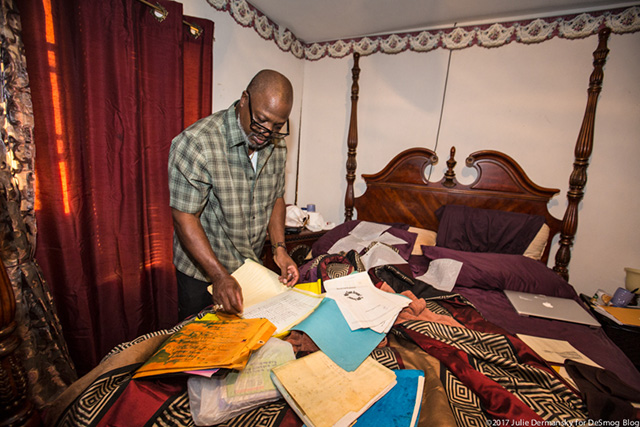 Hilton Kelley tries to separate papers important to him, including plays and poems he wrote, which were soaked in the flood. (Photo: Julie Dermansky)
Hilton Kelley tries to separate papers important to him, including plays and poems he wrote, which were soaked in the flood. (Photo: Julie Dermansky)
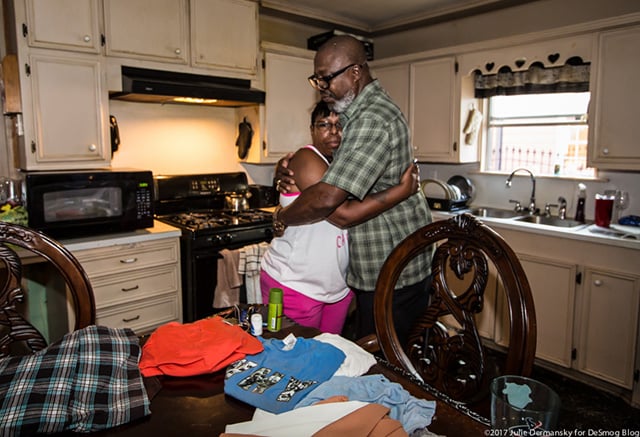 The Kelleys embrace after facing the damage left behind in the aftermath of Hurricane Harvey, which damaged their home and restaurant. (Photo: Julie Dermansky)
The Kelleys embrace after facing the damage left behind in the aftermath of Hurricane Harvey, which damaged their home and restaurant. (Photo: Julie Dermansky)
Kelley isn’t sure what comes next. He wondered aloud about leaving the area. He can carry on with his environmental justice work, which includes legislation to protect the environment, from elsewhere. “It may be time to move to higher ground,” he mused.
But for now, Hilton wanted to emphasize just how much help is still needed in this area.
Kelley is crowdfunding donations for Port Arthur at youcaring.com/hurricaneharveypatx.
Read more about his environmental justice work with the nonprofit he founded, Community In-Power and Development Association, which is also raising funds for Port Arthur recovery efforts.
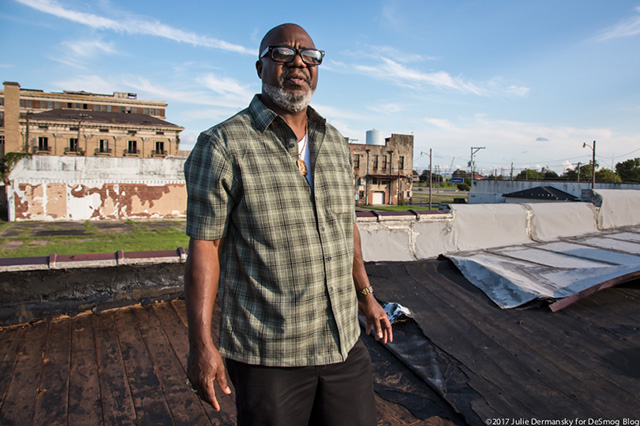 Hilton Kelly on the roof of his restaurant in Port Arthur. During Hurricane Harvey, part of the roof blew off, causing the building to flood from above and below. (Photo: Julie Dermansky)
Hilton Kelly on the roof of his restaurant in Port Arthur. During Hurricane Harvey, part of the roof blew off, causing the building to flood from above and below. (Photo: Julie Dermansky)
Trump is silencing political dissent. We appeal for your support.
Progressive nonprofits are the latest target caught in Trump’s crosshairs. With the aim of eliminating political opposition, Trump and his sycophants are working to curb government funding, constrain private foundations, and even cut tax-exempt status from organizations he dislikes.
We’re concerned, because Truthout is not immune to such bad-faith attacks.
We can only resist Trump’s attacks by cultivating a strong base of support. The right-wing mediasphere is funded comfortably by billionaire owners and venture capitalist philanthropists. At Truthout, we have you.
Our fundraising campaign is over, but we fell a bit short and still need your help. Please take a meaningful action in the fight against authoritarianism: make a one-time or monthly donation to Truthout. If you have the means, please dig deep.